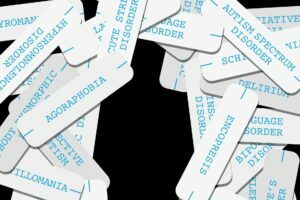From The New Yorker: “In ‘DSM: A History of Psychiatry’s Bible‘ (2021), the medical sociologist Allan V. Horwitz presents reasons for the DSM-5’s botched revolution, including infighting among members of the working groups and the sidelining of clinicians during the revision process. But there’s a larger difficulty: revamping the DSM requires destroying kinds of people. As the philosopher Ian Hacking observed, labelling people is very different from labelling quarks or microbes. Quarks and microbes are indifferent to their labels; by contrast, human classifications change how ‘individuals experience themselves—and may even lead people to evolve their feelings and behavior in part because they are so classified.’ Hacking’s best-known example is multiple personality disorder. Between 1972 and 1986, the number of cases of patients with multiple personalities exploded from the double digits to an estimated six thousand. Whatever one’s thoughts about the reality of M.P.D., he observed, everyone could agree that, in 1955, ‘this was not a way to be a person.’ No such diagnosis existed. By 1986, though, multiple personality disorder was not only a recognized psychiatric label; it was also sanctioned by academics, popular books, talk shows, and, most important, the experiences of people with multiple personalities. Hacking referred to this process, in which naming creates the thing named—and in which the meaning of names can be affected, in turn, by the name bearers—as ‘dynamic nominalism.’
Three new books—Paige Layle’s ‘But Everyone Feels This Way: How an Autism Diagnosis Saved My Life,’ Patric Gagne’s ‘Sociopath: A Memoir,’ and Alexander Kriss’s ‘Borderline: The Biography of a Personality Disorder‘—illustrate how psychiatric classification shapes the people it describes. It models social identities. It offers scripts for how to behave and explanations for one’s interior life. By promising to tell people who they really are, diagnosis produces personal stakes in the diagnostic system, fortifying it against upheaval.”

***
Back to Around the Web











